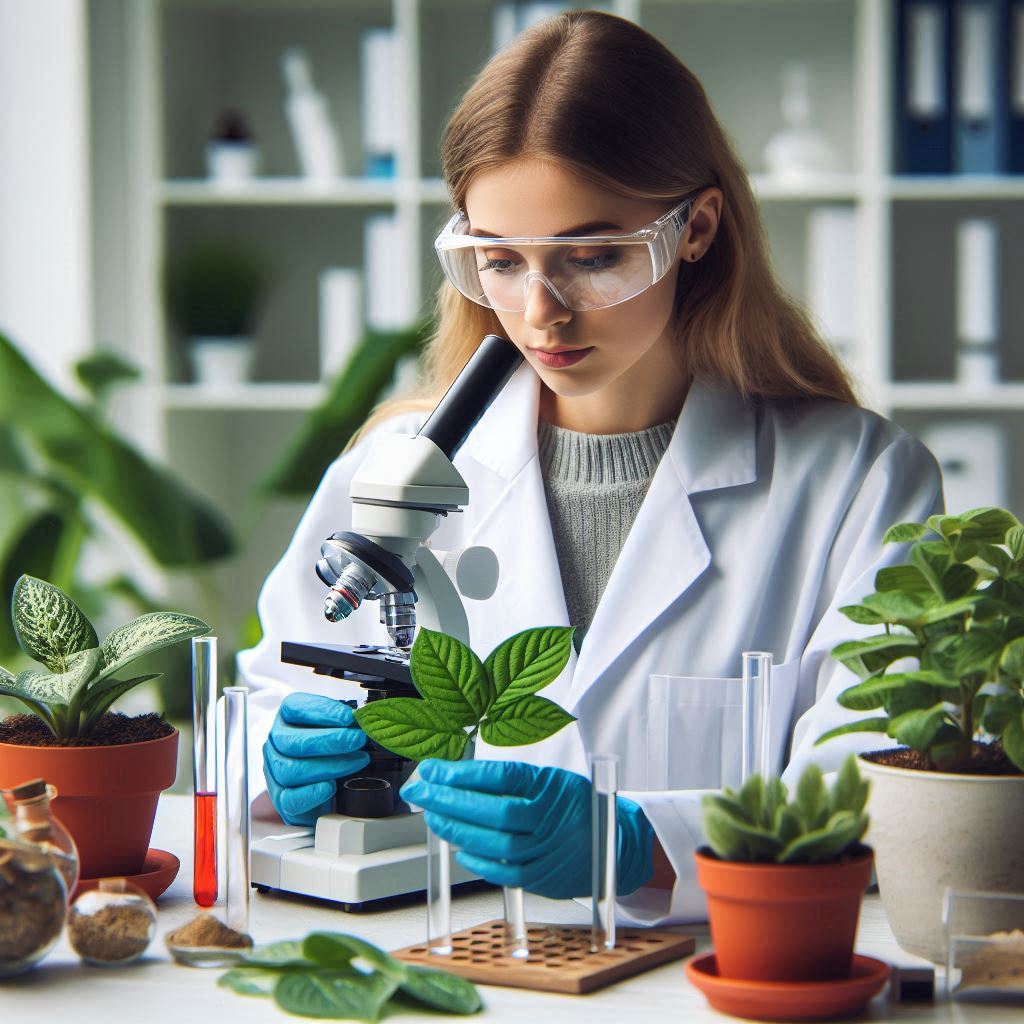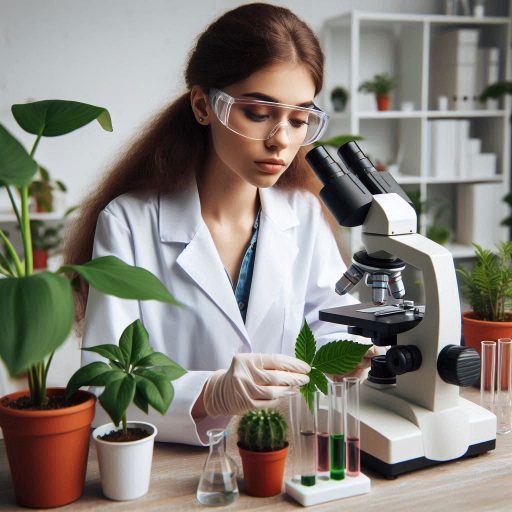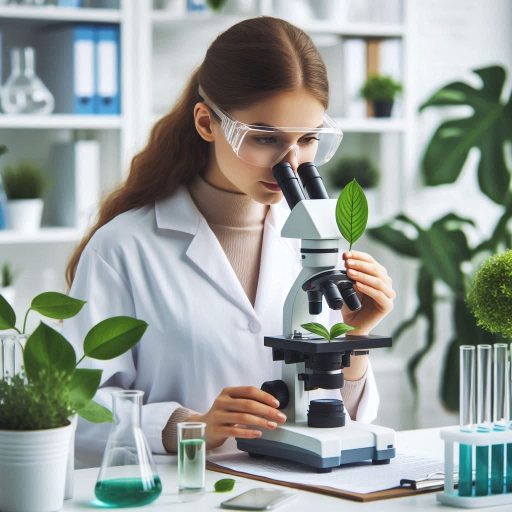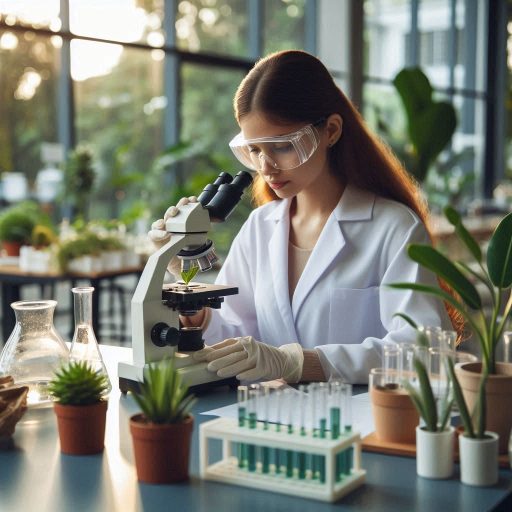Introduction
Plant biotechnology focuses on using scientific tools to improve plants for agriculture and environmental sustainability.
This field combines genetics, molecular biology, and biochemistry to develop innovative solutions for food production.
Exploring careers in plant biotechnology is crucial as it addresses global challenges like food security and climate change.
Professionals in this field work on developing disease-resistant crops, enhancing nutritional content, and improving agricultural practices.
Their work directly impacts global food supplies and environmental health.
Pursuing a career in plant biotechnology offers numerous benefits.
First, it provides opportunities to work with cutting-edge technologies and innovations.
Second, it offers diverse career paths, including research, development, and regulatory roles.
Third, professionals enjoy competitive salaries and strong job prospects due to growing industry demand.
Furthermore, this field allows individuals to contribute to meaningful projects that improve the quality of life worldwide.
Plant biotechnology plays a vital role in shaping the future of agriculture and food security.
By pursuing a career in this field, you can make a significant difference while enjoying a rewarding professional journey.
Exploring opportunities in plant biotechnology can lead to a fulfilling career dedicated to enhancing global sustainability.
Overview of Plant Biotechnology
Plant biotechnology is a rapidly evolving field that merges biology and technology to improve plants.
This discipline applies scientific techniques to enhance plants’ traits, boosting their productivity and resilience.
Through genetic modification, tissue culture, and molecular biology, researchers can develop crops that withstand pests, diseases, and extreme climates.
These innovations play a crucial role in agriculture, food security, and environmental sustainability.
Definition of Plant Biotechnology
Plant biotechnology is the application of biotechnological techniques to modify plants for specific purposes.
It involves using advanced tools such as genetic engineering, gene editing, and cloning to alter plants’ genetic makeup.
By manipulating plant genes, scientists can create crops with desirable characteristics, such as higher yields or enhanced nutritional value.
This approach enables precision in crop development, offering solutions to some of the world’s most pressing agricultural challenges.
Different Areas of Study Within Plant Biotechnology
There are several areas of study within plant biotechnology, each contributing uniquely to agricultural advancements.
One key area is genetic engineering, where scientists insert specific genes into plants to enhance their traits.
This technique has led to the development of pest-resistant, drought-tolerant, and nutrient-rich crops.
Another area is plant tissue culture, which allows the regeneration of plants from a small sample of cells.
This method is widely used for cloning plants, preserving endangered species, and mass-producing disease-free crops.
Molecular breeding is another critical field that uses molecular markers to select plants with desirable traits more efficiently.
It accelerates the breeding process by identifying specific genes responsible for beneficial characteristics, such as faster growth or improved taste.
Finally, bioremediation is a growing area where plants are engineered to clean up polluted environments.
These plants can absorb harmful substances like heavy metals, reducing environmental damage.
Importance of Advancements in Plant Biotechnology for Agriculture and Food Security
Advancements in plant biotechnology are vital for ensuring global food security.
The world‘s population is growing rapidly, and agricultural land is shrinking due to urbanization and climate change.
Biotechnological innovations allow farmers to produce more food on less land while minimizing the use of harmful chemicals.
Genetically modified crops can resist pests and diseases, reducing the need for pesticides that harm the environment.
These crops also require less water, making them ideal for regions facing drought.
In addition, plant biotechnology contributes to improving food quality and nutrition.
Biofortification, for instance, increases the levels of essential vitamins and minerals in crops, helping to combat malnutrition.
This technology is particularly beneficial in developing countries, where food scarcity and nutrient deficiencies are prevalent.
Plant biotechnology holds immense potential to revolutionize agriculture and strengthen food security worldwide.
By harnessing the power of genetic engineering, molecular breeding, and tissue culture, we can build a more sustainable and resilient agricultural system.
Read: U.S. Cities with the Most Opportunities for Environmental Scientists
Education and skills required
A career in plant biotechnology requires a solid educational foundation and the right set of skills.
Aspiring professionals must pursue formal education and develop specific qualities to thrive in this fast-evolving field.
Understanding the academic requirements and the key competencies will help individuals prepare for success in plant biotechnology.
Education Needed to Work in Plant Biotechnology
A bachelor‘s degree in biotechnology, plant science, or molecular biology is essential to start a career in plant biotechnology.
Most entry-level positions require a strong understanding of biology, genetics, and chemistry.
This foundational knowledge prepares individuals to work on plant research and genetic engineering projects.
However, many advanced positions demand further specialization through a master‘s or Ph.D. program.
Graduate studies allow individuals to focus on areas like genetic modification, plant pathology, or molecular breeding.
These programs also provide opportunities for hands-on research experience, which is crucial for developing expertise.
Key Skills and Qualities Necessary for Success in This Field
Technical expertise in molecular biology techniques, such as DNA sequencing, gene editing, and tissue culture, is essential for plant biotechnologists.
Mastery of these laboratory techniques allows professionals to conduct experiments, analyze data, and develop new plant varieties.
Additionally, a strong background in data analysis is important, as biotechnology involves interpreting large datasets and drawing meaningful conclusions.
Familiarity with bioinformatics and statistical tools is highly valuable in this context.
Problem-solving and critical-thinking skills are also crucial for success in plant biotechnology.
The field requires creativity in designing experiments and troubleshooting when results do not align with expectations.
Moreover, plant biotechnologists must be detail-oriented and able to work precisely to avoid errors in genetic manipulation.
Strong communication skills are equally important.
Plant biotechnologists often work in interdisciplinary teams, and they must effectively convey complex scientific concepts to colleagues, stakeholders, and the public.
Additionally, writing clear and concise reports is vital for sharing research findings with the scientific community.
Importance of Staying Updated on the Latest Technologies and Trends
Staying updated on the latest technologies and trends is critical for anyone working in plant biotechnology.
The field evolves rapidly with the introduction of new gene-editing tools, advanced laboratory techniques, and innovative agricultural practices.
Professionals must continuously educate themselves to remain competitive and capable of implementing cutting-edge solutions.
Attending conferences, enrolling in workshops, and participating in webinars can help individuals stay informed about new developments.
Reading scientific journals and collaborating with other experts in the field also contribute to ongoing learning.
A strong educational background and a blend of technical, analytical, and communication skills are necessary to succeed in plant biotechnology.
Staying updated on industry advancements ensures professionals remain innovative and capable of addressing emerging agricultural challenges.
Read: Environmental Scientist vs. Ecologist: Roles and Differences in the US
Career opportunities in plant biotechnology
Plant biotechnology offers a range of exciting career opportunities for individuals passionate about plants and scientific innovation.
As the field continues to grow, numerous roles are available for professionals with the right skills and qualifications.
From research scientists to field technicians, these careers allow individuals to make significant contributions to agriculture, sustainability, and food security.
Research Scientist
A career as a research scientist in plant biotechnology involves investigating plant genetics, developing new crop varieties, and enhancing plant traits.
These scientists work in laboratories, using molecular biology techniques to manipulate plant DNA and study the results.
Research scientists often collaborate with other experts to solve agricultural problems such as pest resistance or climate adaptation.
Specialization within this role may focus on plant genetics, plant pathology, or biotechnology methods like CRISPR gene editing.
Genetic Engineer
Genetic engineers play a crucial role in plant biotechnology by directly modifying plants’ genetic material to improve specific traits.
They work on creating genetically modified organisms (GMOs) that offer increased yields, better nutritional content, or resistance to pests and diseases.
Genetic engineers typically work in research facilities, universities, or agricultural companies.
Opportunities for specialization include focusing on gene editing tools, such as CRISPR, or working on specific crops like corn, soybeans, or wheat.
Agronomist
Agronomists apply plant biotechnology knowledge to optimize crop production and improve soil management techniques.
They work closely with farmers, advising on best practices for planting, fertilizing, and harvesting.
Agronomists often conduct field research to test the effectiveness of different biotechnological applications, such as genetically engineered seeds.
Specializing as a crop agronomist or a soil scientist offers additional career opportunities.
Agronomists may also focus on sustainable agriculture practices, helping to reduce environmental impact while boosting crop productivity.
Biotechnologist
A biotechnologist uses scientific techniques to solve problems related to plant growth, development, and production.
Biotechnologists often work in laboratories, developing new plant varieties or improving existing ones.
Their work can involve cloning plants, creating biofortified crops, or enhancing disease resistance.
Specializations within this role include tissue culture, where plants are grown in controlled environments, or bioinformatics.
Biotechnologists can also focus on environmental biotechnology, addressing issues like pollution and land degradation.
Field Technician
Field technicians work directly in agricultural settings, assisting researchers and scientists by conducting experiments, collecting data, and maintaining crops.
They play a vital role in ensuring that laboratory research translates effectively to real-world agricultural environments.
Field technicians often work in test plots, greenhouses, or farms, gathering information on plant performance and health.
Specializing in crop management, plant health monitoring, or soil analysis can enhance career prospects.
Opportunities for Specialization
Each role in plant biotechnology offers numerous opportunities for specialization.
Research scientists can focus on genetic research, while genetic engineers may specialize in specific editing techniques.
Agronomists and biotechnologists can dive deeper into sustainable practices, crop varieties, or environmental applications.
This diversity in specialization allows professionals to tailor their careers to their interests and the needs of the agricultural industry.
Plant biotechnology provides a variety of career paths with opportunities for growth and specialization in key areas of agriculture and sustainability.
Read: The Relationship Between U.S. Policy & Environmental Scientist Roles

Industry trends and growth
Plant biotechnology is rapidly advancing, with new innovations and technology reshaping the agricultural landscape.
Current trends are focused on improving crop resilience, increasing food production, and addressing environmental challenges.
These trends are shaping the future of agriculture and are expected to drive significant industry growth in the coming years.
Transform Your Career Today
Unlock a personalized career strategy that drives real results. Get tailored advice and a roadmap designed just for you.
Start NowCurrent Trends in Plant Biotechnology
One major trend in plant biotechnology is the development of genetically modified crops that can withstand extreme environmental conditions.
These crops are designed to tolerate drought, salinity, and temperature fluctuations, which are becoming more frequent due to climate change.
This trend helps ensure food production remains stable even in harsh conditions.
Another key trend is biofortification, where crops are engineered to have higher nutritional content.
For example, scientists have developed crops with enhanced levels of vitamins, minerals, and proteins to combat malnutrition.
This innovation has significant potential to improve global health, especially in developing countries.
The use of gene editing tools like CRISPR is also on the rise.
CRISPR technology allows precise alterations to plant DNA, enabling the development of crops with specific traits such as disease resistance or faster growth.
This technique offers a faster and more accurate way to modify plants compared to traditional breeding methods.
Additionally, sustainable agriculture practices are gaining momentum within the field of plant biotechnology.
Researchers are working to develop crops that require fewer inputs like water, fertilizers, and pesticides.
These sustainable crops help reduce the environmental impact of farming while maintaining high yields.
Projected Growth of the Industry
The plant biotechnology industry is projected to grow substantially over the next decade.
The global population is expected to reach 9.7 billion by 2050, which will increase the demand for food production.
As traditional farming methods struggle to meet this demand, biotechnological solutions will become essential.
Market analysts project that the global plant biotechnology market will reach $73.9 billion by 2025.
This growth stems from the rising demand for sustainable agricultural practices and enhanced food security.
Governments and private organizations are investing heavily in research and development, further accelerating the industry’s growth.
The demand for genetically modified crops is expected to rise, especially in regions facing food scarcity due to climate change.
This shift will create more opportunities for professionals and companies involved in plant biotechnology.
Potential Impact of Technology Advancements on the Field
Technological advancements in plant biotechnology will have a profound impact on agriculture.
Innovations like artificial intelligence (AI) and machine learning are being integrated into plant research to enhance crop analysis and improve breeding efficiency.
AI can analyze large datasets to predict how certain genetic modifications will affect plant performance, allowing for faster and more accurate decision-making.
Advances in precision farming technologies, such as drones and sensors, are also improving crop monitoring and management.
These technologies allow farmers to monitor crops in real-time, adjusting their practices to optimize plant health and yield.
Current trends and technological advancements are driving the growth of the plant biotechnology industry.
As these innovations continue to develop, they will have a lasting impact on global agriculture and food security.
Read: Organizations & Associations for Environmental Scientists in the USA
See Related Content: Marine Biology and Marine Animal Behavior
Salary and Job Outlook
Plant biotechnology offers competitive salaries and strong job prospects due to growing global demand for sustainable agricultural solutions.
Professionals in this field can expect rewarding careers, both financially and in terms of impact on society.
Average Salary Range for Professionals in Plant Biotechnology
The average salary in plant biotechnology varies depending on experience, education, and job role.
Entry-level professionals with a bachelor’s degree typically earn between $45,000 and $65,000 per year.
These positions may include roles like laboratory technician or research assistant, where individuals assist in plant research and data collection.
As professionals gain experience and pursue advanced degrees, their earning potential increases.
Those with a master’s degree or Ph.D. can earn significantly more, especially in specialized roles.
For example, research scientists and genetic engineers often earn between $75,000 and $100,000 annually.
Senior-level positions in biotechnology companies, government agencies, or academic institutions often pay over $120,000 for experienced professionals.
Biotechnologists in high-demand areas like genetic engineering or crop improvement can command premium salaries.
Their specialized skills significantly increase their earning potential.
Location also plays a role in salary variations, with professionals in major biotech hubs earning higher wages than those in rural areas.
Job Outlook and Demand for Skilled Professionals in This Field
The job outlook for plant biotechnology professionals is promising.
As the global population grows and climate change challenges agricultural systems, the need for innovative plant biotechnology solutions is increasing.
The biotechnology industry is expected to experience significant growth over the next decade, creating more job opportunities for skilled professionals.
The U.S. Bureau of Labor Statistics projects that jobs in biotechnology, including plant biotechnology, will grow by 5% to 7% from 2020 to 2030.
This growth is driven by the increasing demand for genetically modified crops, sustainable agriculture practices, and biofortified foods.
Companies, research institutions, and government agencies are investing heavily in plant biotechnology to improve food security and reduce environmental impact.
The demand for plant biotechnologists is particularly high in regions facing agricultural challenges, such as drought-prone areas or regions with degraded soils.
Professionals with expertise in genetic engineering, molecular biology, and data analysis are especially sought after in these areas.
Factors That May Influence Salary and Job Availability
Several factors can influence salary and job availability in plant biotechnology.
Education is one of the most significant factors, with advanced degrees often leading to higher-paying roles.
Experience in specialized techniques, such as CRISPR gene editing or bioinformatics, also boosts earning potential.
Geography is another key factor, as professionals in biotech hubs like California, Massachusetts, and North Carolina tend to earn higher salaries.
Industry demand for specific skill sets, such as sustainable agriculture or precision farming, can also affect job availability and salary levels.
Plant biotechnology offers a range of career opportunities with competitive salaries and strong job prospects.
Advanced education, specialization, and location are key factors that influence both salary and job availability in this growing field.
Uncover the Details: Key Tools and Technologies in Materials Science
Learn More: Materials Science in Aerospace and Automotive Industries
Networking and Professional Development
Networking and professional development are crucial for success in the plant biotechnology industry.
Building relationships with experts and staying current on new advancements can significantly enhance career opportunities.
Importance of Networking Within the Plant Biotechnology Industry
Networking allows plant biotechnologists to exchange ideas, collaborate on projects, and stay informed about industry trends.
Connecting with professionals in the field opens doors to job opportunities, research partnerships, and new technologies.
Strong industry connections can also provide guidance, mentorship, and access to resources that may not be available otherwise.
Networking plays a vital role in professional growth.
By engaging with others in the field, individuals can gain insights into emerging trends and innovations.
It helps professionals build their reputation, enhance their credibility, and increase their visibility in the plant biotechnology community.
Networking also fosters collaboration, which is essential for solving complex agricultural challenges.
Ways to Connect With Professionals and Organizations in the Field
To build a strong professional network, individuals should actively seek opportunities to meet others in the plant biotechnology industry.
Attending conferences, workshops, and industry events provides an excellent platform to connect with like-minded professionals.
Events like these allow attendees to learn about the latest advancements, meet experts, and discuss emerging technologies.
Joining professional organizations and associations can also be highly beneficial.
Groups like the American Society of Plant Biologists and the International Society for Plant Molecular Biology provide networking opportunities.
They also offer valuable resources and career development information.
Membership often includes access to industry publications, webinars, and forums where professionals can exchange ideas and stay updated on current research.
Social media and online platforms like LinkedIn are also valuable tools for networking.
Plant biotechnologists can join online groups, participate in discussions, and connect with industry leaders.
Online platforms enable professionals to maintain relationships and stay engaged with peers, even if they are not geographically close.
Opportunities for Continuing Education and Professional Development
Continuing education and professional development are essential in a rapidly evolving field like plant biotechnology.
Advancements in gene editing, sustainable agriculture, and crop improvement demand that professionals continually update their skills and knowledge.
Staying informed about the latest tools and technologies is crucial for career advancement.
Many universities and organizations offer specialized courses, certifications, and workshops focused on plant biotechnology.
These programs help professionals deepen their expertise in areas like molecular biology, genetic engineering, and bioinformatics.
Online courses provide flexibility, allowing professionals to learn at their own pace while balancing work responsibilities.
Attending industry conferences and seminars also contributes to professional development.
These events offer valuable learning experiences, as they provide insights into cutting-edge research and innovations.
Workshops and training programs enable professionals to develop new skills, network with industry experts, and expand their knowledge base.
Networking and professional development are essential for success in plant biotechnology.
By connecting with industry professionals and continuing their education, individuals can advance their careers and contribute to the field‘s growth.
Find Out More: How to Become a Hydrologist: Steps and Requirements
Conclusion
Pursuing a career in plant biotechnology offers numerous benefits, including innovation, job growth, and a meaningful impact on society.
Professionals in this field play a critical role in solving global challenges related to food security, sustainability, and climate change.
Plant biotechnology provides diverse career options, from research scientists and genetic engineers to field technicians.
These roles offer opportunities to work with cutting-edge technologies and improve agricultural practices.
Individuals passionate about science, innovation, and sustainability will find plant biotechnology an exciting and rewarding career path.
The field‘s future looks promising, with advancements like gene editing, biofortification, and precision agriculture revolutionizing the way we produce food.
Professionals in plant biotechnology will lead efforts to increase crop yields, reduce environmental impact, and develop resilient crops for a changing climate.
If you’re seeking a career that combines science, technology, and societal impact, plant biotechnology is an ideal choice.
The demand for skilled professionals continues to grow, offering job stability and opportunities for specialization.
Plant biotechnology holds immense potential for advancing global agriculture and improving food security.
Consider exploring this field, where your work can shape a more sustainable future for generations to come.
Transform Your Career Today
Unlock a personalized career strategy that drives real results. Get tailored advice and a roadmap designed just for you.
Start Now



